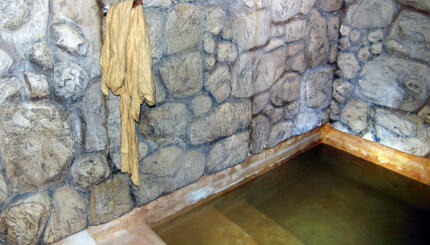Serah, daughter of Asher, is mentioned in the Bible in the count of the Israelites who went down to Egypt (Genesis 46:17) and in the enumeration of the Israelites at the steppes of Moab (Numbers 26:46). Aside from this, she takes no part in any narrative, nor is anything said about her.
In contrast, there are a plethora of midrashic traditions about this woman and thus the faceless Biblical character becomes a fascinating personality. Her history is intertwined with the story of the migration to Egypt and enslavement, and also with redemption and the return to the Land of Israel. She lived to an extremely old age and, accordingly, was blessed with much earthly wisdom and knowledge, which she used to help the people of Israel as needed, even during the time of the Rabbis.
Midrashic Interpretations of Serah
The midrash speaks of Serah’s great beauty and wisdom: when Joseph was reunited with his brothers and sent them to the land of Canaan to bring his father Jacob to him in Egypt, he ordered them not to alarm their aged father. The brothers summoned Serah and asked her to sit before Jacob and play for him on the lyre, in this manner revealing to him that Joseph was still alive. Serah played well and sang gently: “Joseph my uncle did not die, he lives and rules all the land of Egypt.”
Enumeration of the Israelites
Although Genesis 46:17 lists Serah among the seventy members of Jacob’s family who went to Egypt, the Rabbis observe that a count of the names in Genesis 46 totals only sixty-nine. Logic would dictate that Jacob himself completed the count of seventy souls, but the midrash maintains that Serah was the seventieth member of the Israelite party (Genesis Rabbah 94:9).
With your help, My Jewish Learning can provide endless opportunities for learning, connection and discovery.
According to this view, she was intentionally not enumerated among the seventy, because she entered the Garden of Eden while still alive. This exegesis might be based on a tradition preserved only in the late midrash, according to which she was the daughter of Malchiel son of Elam and Hadorah, the granddaughter of Eber, and was adopted by Asher after the death of her father and her mother’s marriage to Asher. Serah was raised in Asher’s home as his daughter, but since she was adopted, she was not listed among Jacob’s seventy descendants (see Sefer haYashar, Vayeshev, chapter 14).
Serah Identifies the Liberator of the Israelites from Egypt
The Rabbis assign to Serah an important role in identifying Moses as the redeemer who would deliver the Israelites from Egypt. The midrash relates that the secret of redemption was given over to Abraham, who conveyed it to Isaac, Isaac to Jacob, and Jacob to Joseph. Joseph transmitted the secret of redemption to his brothers, telling them (Genesis 50:25): “When God has taken notice of you, you shall carry up my bones from here” and Asher passed it along to his daughter Serah.
When Moses and Aaron came to the Israelite elders and performed miracles before them, they went to Serah and told her: “A certain man has come to us and performed such-and-such wonders.” She replied, “There is no substance to him” (that is, he is not the deliverer). They then said to her: “He also said: ‘When God has taken notice of you’.” She said: “This is the man who will redeem Israel from Egypt, for I heard from my father ‘He will take notice’.” Then the people immediately believed in their God.
In the midrashic account, Serah helped Moses to fulfill the oath sworn to Joseph, to carry up his bones. When the Israelites were ready to leave Egypt they were occupied in taking booty, and Moses was the only one who was engaged with Joseph’s bones.
Serah was the only one of that generation still alive. Moses went to her and asked: “Do you know where Joseph is buried?” She answered: “They placed him here. The Egyptians made for him a metal coffin and sunk it in the Nile, so that its waters would be blessed.” Moses then went to the Nile, stood on the bank and called out to the bones of Joseph. Joseph’s coffin immediately rose to the surface and Moses took it (Babylonian Talmud Sotah 13a). This led the Rabbis to state that Serah delivered “the faithful one to the faithful one,” since she gave Joseph over to Moses when they departed from Egypt (Genesis Rabbah 94:9).
Serah’s Longevity
According to the Rabbis, not only was Serah among those who came to Egypt and one of those who left it, she also entered The Land of Israel; they use as a proof text for the latter claim Numbers 26:46, that includes Serah among the names of those entering the land (Seder Olam Rabbah 9).
The traditions of Serah’s extreme longevity apparently have their basis in the fact that she is mentioned both in the count of those who went to Egypt and in the list of those who entered The Land of Israel. This evolved into the tradition that Serah lived for hundreds of years, was in the presence of both Joseph and Moses and was even one of those who entered the land of Canaan.
In the development of this tradition her lifetime extended to the period of King David and the later traditions claimed that she never died at all, but entered the Garden of Eden while still alive. In the late midrash, Jacob is the one who blessed Serah that she would live forever, telling her: “My daughter, because you revived my spirit, death shall never rule you” (Sefer ha-Yashar , Vayigash, chapter 14).
The character of Serah, who accompanies the Israelites to Egypt and enters the land of Canaan with them, embodies the history of the people of Israel. Her character is linked with those of the people’s leaders, and she expedites the realization of the Divine plan. This is her role when she convinces Jacob that Joseph still lives, thus resulting in his going down to Egypt; she continues in this task when she identifies Moses as the true redeemer of Israel, thus leading the people to heed him; and thus, when she helps Moses to find Joseph’s bones, so as not to delay the Exodus from Egypt. Serah’s appearance seemingly confirms that God’s promises will be fulfilled and that the people of Israel will leave Egypt and come to and take possession of the Promised Land.
Talmud
Pronounced: TALL-mud, Origin: Hebrew, the set of teachings and commentaries on the Torah that form the basis for Jewish law. Comprised of the Mishnah and the Gemara, it contains the opinions of thousands of rabbis from different periods in Jewish history.



